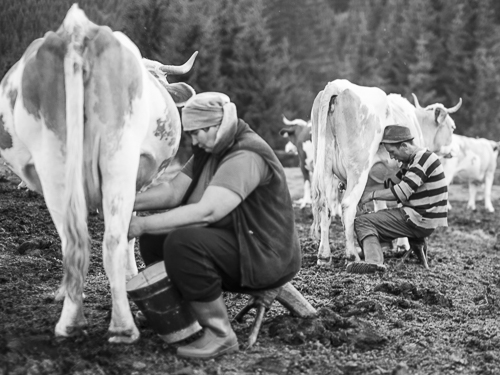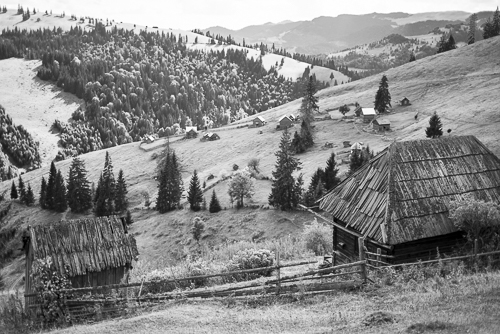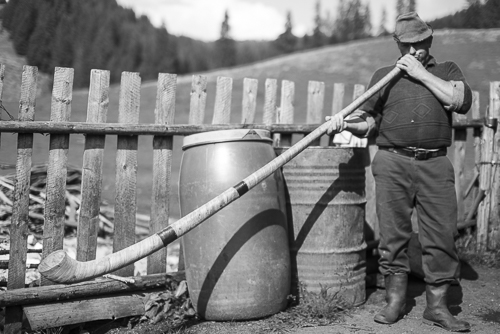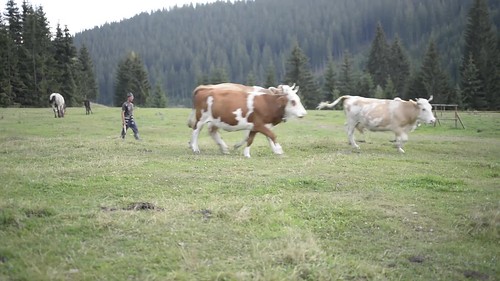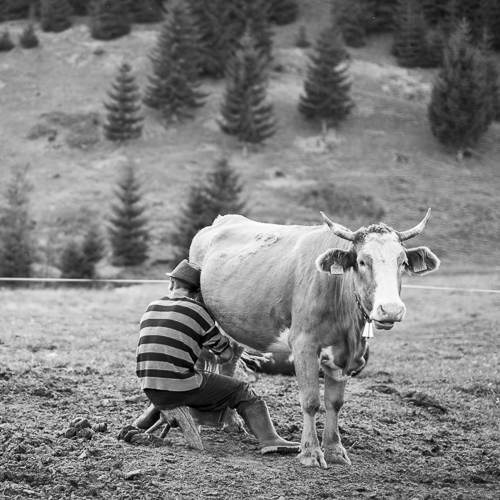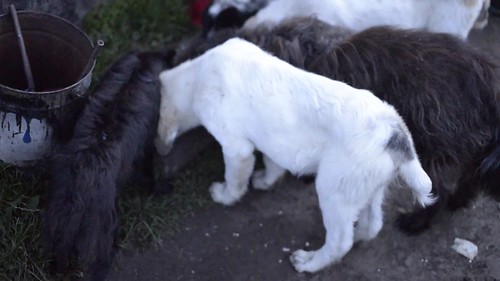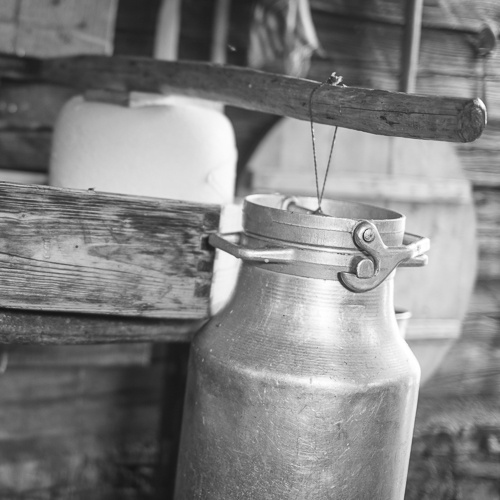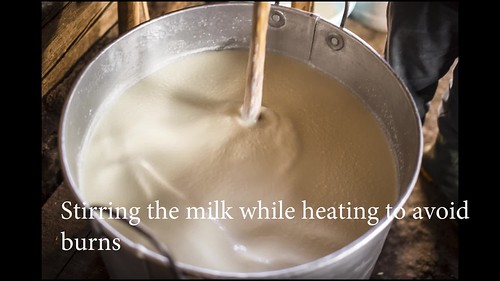Part of my trip to Transylvania should consist of staying one night at a sheepfold. First, we went to the guesthouse of Levente Gáll, who drove us and a couple on honeymoon up to the Tarcău Mountains, forming a small part of the Carpathians, On our way we passed several timber houses, which were decaying, mainly starting with holes in the roof. Thinking of the manual work just to make the wooden shingles covering the roof, I felt wistful.
Farther away we could see farms with corrugated iron roofs located on meadows surrounded by forest. Levente told us that before grandparents, parents and children could stay for a couple of months in summer, but now they stay just one or two nights to cut hay because they get support from the EU to keep the landscape open. We also passed several wooden gates, separating the mountain in areas because each village in the nearby valleys own parts of the mountain.
On the top of the mountain, we met some men going back to the lowlands with horse and cart and we passed a flock of sheep being guarded by two shepherds who used short, sharp commands to guide the sheep. We passed a mountain farm where a bitch had born puppies shortly before our arrival. They were playing and fighting over a piece of meat until their mother just grabbed it and ate it herself.The puppies didn’t even seem to notice their loss. They just went on playing and exploring, but next spring they will have to work for food.
Passing another flock of sheep on our way down to a valley, we soon arrived at a small hut where I and my guide Karoly would spend one night. As a sign of welcome, the boss of the shepherds played a little music for us using his alpine horn called bucium in Romanian..
Levente had brought a large selection of cold cuts, hams, etc. and we had lunch outside in the nice weather. The man of the newly married couple showed how shepherds can make a sound like a gunshot by moving quickly a wooden handle with a rope at one end. Since we were in a valley, the sound reverberated repeatedly until it died out. After some time, Levente and the couple drove back to the guesthouse, while we would stay one night.
As time passed, the cows came back from grazing and went inside a pen where they would be milked. When most of the them had arrived, the shepherds closed the pen and turned on an electric fence powered by solar cells.
The shepherds who had been outside all day, also went to the pen where they would take a three-legged wooden chair made out of one piece of wood only and having a height, of, say, 30 cm. Then, they put the chair on the ground next to the udder of a cow and sat down, always sitting wide-legged in order to obtain good balance. Sometimes, the cows move or they sort of hit the shepherds with their tails, making a stable chair necessary. Mostly, the cows just stood upright, seemingly not even noticing that they were being milked. A nice feature about this place was the serenity, only broken by the ringing of cowbells, running water from two brooks and a slight wind. In addition, when a cow or horse was passing, the guarding dogs followed it, barking.
Having milked one cow, they went to another one, watching the udder to see if the cow had been milked or not. If a cow hasn’t been milked, the udder looks tight and vice versa. In addition to the shepherds who had been outside all day and the man who had been playing for us, a woman also milked the cows. My guide told me that she was married to the man who played for us when we arrived, their names are Ana and Gabor Borosan, and they had been employed by Levente to supervise the sheepfold. Next, the Borosan couple had employed 3 more shepherds to help them with the animals. When they had milked all the cows, about 50 in all, they brought the milk to the hut and poured it through a porous cloth in order to filter the milk. The shepherds applied pig’s fat to the teats of the cows in order to keep the skin well and they put superfluous fat on their chairs. Afterwards. we could sometimes see the guarding dogs licking the fat on the chairs. Similarly, the cows were sometimes licking a large clump of salt lying on the ground.
The next task consisted of feeding the guarding dogs with whey, pouring it into troughs. The dogs obviously considered it a delicacy, slurping loudly. When they were finished, they were ordered to go back to the sheep pen to guard the sheep against carnivores.
Like the guarding dogs, the shepherds also had to work more. Next, they walked to the sheep pen where 600 sheep were waiting to be milked. Levente owns 100 of them, the Borosan couple own 400 sheep and 3 cows, while the rest is owned by various people. Besides, there were 200 lambs and young sheep, which were not milked.
We arrived at the sheep pen at dusk, but it got dark quickly and soon it was pitch black. Having taken some photos of the shepherds milking the sheep and another shepherd chasing the sheep toward the shed where the other shepherds were milking sheep, we just had to wait for one and a half hour. Each time the shepherd chased the sheep toward the shed, they started running in a circle and almost every time, at least one sheep wasn’t able to approach the shed, instead it got further away from it.
When they were milking the cows, it sounded like water from a garden hose was hitting a metal surface, lasting as long as the shepherd was pulling a teat, then the same sound was repeated as long as milk was remaining. Instead, when the sheep were milked, they produced little milk and we could hardly hear anything.
In the beginning, I could hardly see the stars, but as it got completely dark, I imagined I could even see the Milky Way stretching like a diffuse ribbon across the sky. I also tried to find the polar star by extrapolating the handle of the Big Dipper. By locating it, one can find north, but since I didn’t check the cardinal directions in daylight, it was just to pass the time. Astonishingly, a large guardian dog came to my guide in order be caressed, next it came to me. Without thinking, I put my hand on its head, then I remembered that you should never do it because it shows the dog that you are dominant. Being bitten by a big dog was to be avoided at all costs and I pulled my hand towards me as quickly as possible. Next, the dog just disappeared in the night.
Finally, the shepherds were ready to go back when I heard Mrs Borosan say the only word I understood during my whole stay at the sheepfold: perduto, meaning lost in Italian. Then, I finally understood that they were speaking Romanian and not Hungarian as I had thought. Later, my guide told me that she talked about a shepherd, who had stayed with them for two months, then he disappeared for two days before returning to the sheepfold. The reason why he was away so long was that he didn’t know their names, even after 2 months. Strange, isn’t it?
On our walk back to the hut, I followed the shepherds as closely as possible. My trusty, old Nokia phone couldn’t even have lit up the ground next to my feet. Staying outside in the dark with 20 more or less feral guarding dogs wasn’t an option. Back at the hut, we ate dinner with the shepherds, then we went to sleep. Since the beds were hard, bumpy and short, it wasn’t a good night’s sleep. Anyway, we could sleep inside, while one or more of the shepherds had to sleep outside in a simple shed, guarding the sheep.
In the morning, I could hear the shepherds getting up to milk the sheep again, but both of us preferred to sleep. When I got up, the shepherds had finished milking the sheep and had started milking the cows. The air was damp, crisp and cold, the ground was covered by dew, fog was rising from the ground, white dots on the meadows were in fact dogs which were sleeping on the ground, but the cows looked totally unfazed by staying outside at night. The shepherds, who were milking the cows, had rolled up their sleeves. Instead, I started freezing on my hands after having taken just a few photos. I imagined that they weren’t freezing because they held the warm teats of the cows, but the real reason was probably that I’m not used to working outside.
After they had finished milking the cows, the pen was opened and they were free to go grazing. Next, it was feeding time for the dogs again.
As expected, they were served whey again, which the slurped loudly and willingly. At the same time, the pigs in the pigsty made happy noises, anticipating a tasty breakfast. When the dogs were eating, the shepherds started calling loudly because one dog was apparently missing. After some time, a big white dog came running towards the trough. The day before, four cows were missing during milking, but they arrived after some time. In addition, they chased away some cows, which belonged to the adjacent sheepfold. In retrospect, it almost feels like the shepherds are parents who want to know where all their 1000(?) offspring are staying and let other parents take care of their own offspring! When all the animals had been fed, the dogs were ordered to go back guarding the sheep. Then, it was breakfast for the shepherds, consisting of the same as dinner last night: soup, coarse sausages, bread and cheese. Afterward they went back to the sheep to let them go grazing all day before leading them back to the pen in the evening.
Finally, the Borosan couple, my guide and I could have breakfast. My guide had collected mushrooms on our way to the hut and Mrs Borosan kindly prepared them for us. We also got served maize, bread and cheese.
As expected, it was time to make cheese after breakfast. First, Mr Borosan separated cheese mass from the whey, he put the cheese mass inside a porous cloth and he compressed it to get rid of more whey. In the end, he put a wooden beam above the cheese mass and attached one end to the wall, while he hung a container full of milk in the other end. Doing it this way, he made the force of gravity work for him. Excess whey was fed via a chute to a container on the floor.
Next, he reheated the remaining whey and, after having waited some time, he turned it into ricotta. Before we went down to the valley, we could eat as much ricotta with jam as we wanted. Delicious!
Mrs Borosan also told my guide that it was almost impossible to get good shepherds, they smoke a lot and she had to ration how much much they could smoke. She tried to limit their consumption to one packet a day, but they wanted more. Since they are paid very little, if they smoke too much, they won’t get any salary. Although Mr Borosan was the formal boss at the sheepfold, Mrs Borosan was the real one. This sheepfold was apparently the only one with a woman in charge, cooking good meals and keeping the place tidy. Instead, one sheepfold we visited was anything but tidy. The Borosans had been married for 30 years, they had 5 children and they had all spent their summer holidays at the sheepfold. Instead, their grandchildren want to return almost as soon as they arrive, missing soft drinks, using their smartphones and so on. Here, there is no signal and not possible to call anyone. Anyway, there has been one improvement for the last 5 years: lamps powered by solar cells. Before, they were using paraffin lamps, something only very nostalgic or conservative people can be missing.
The season lasts from May to October and the shepherds walk with the animals from the valley to the sheepfold. It takes about 14 hours and they walk down again in October. The shepherds only have guarding dogs to guard against wolves and bears, but no shepherd dogs, which could help them guide the sheep. They aren’t allowed to kill wolves or bears and they are only armed with sticks and the wooden handle with a rope at one end..
Mrs Borosan was pessimistic regarding the future of the sheepfold, imagining that in 10 years time, nobody will work as shepherds any longer. At least, young Romanians won’t do it. Unfortunately, it’s more or less a worldwide trend that young people don’t want to do hard and practical work.
Last but not least: the horses. There were several horses near the sheepfold, but nobody looked after them. Being a guest, I felt they were part of the landscape. However, I suppose they are use for carrying stuff and pulling wagons at the start and at the end of the season in the mountains. Everyone at the sheepfold has to be useful in some way, else they can’t stay there.
Before we walked down to the lowlands, where we were told that a car with a hidden key would be waiting for us, my guide bought one big cheese, weighing about 6 kg, and one ricotta weighing about the same. In fact, we bought them together, but I had paid everything in advance. Next, we walked on more or less muddy roads back to the car, passing another sheepfold with a couple of very angry dogs.
Having made a film on both the truffle dogs and the guarding dogs, the contrast could hardly have been greater, While the truffle dogs are part of a family, sleeping inside, getting lots of caresses and treats, the guarding dogs sleep outside all year, getting no caresses and no treats, However, they have to be tough in order to fight wolves and bears, which may attack the sheep and the cows.
Let’s hope that some young couple from a rich country and who are fed up with a busy lifestyle will prefer to move to Romania and keep this ancient tradition going for many years to come.
31 December 2017: I’m still with the shepherds and animals at the mountain farm in my mind. They made such a great impression on me! Fortunately, a young woman has published an article about working with goats on a mountain farm in Norway in a magazine called Ren Mat (Clean Food) of which I’ll give a short extract: We take the cold mass (meaning whey, which has been heated and stirred for several hours) inside and turn it into easily recognisable cubes. Customers consisting of tourists passing by and local people, enter, holding their banknotes ready. The brown goat cheese is easy to sell. It’s got an identity, a history and it’s the best I’ve ever tasted. It tastes cramps in my arms from not being used to milking, mastery of finally being able to milk the goats, soft and sweet and sharp. We eat incredible amounts sitting around a crowded table, we go to bed early and we dream strange dreams.
We are woken before 6 in the morning by our teacher Even Hov when he knocks on the ceiling below where we are sleeping. I don’t have a watch, the farm where we are staying doesn’t have mains current and there is no coverage for using a mobile phone. Time doesn’t care, but everything I do during the day means something.
